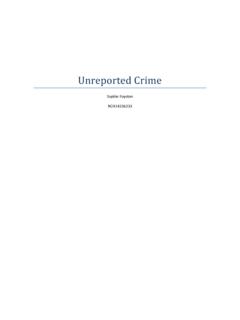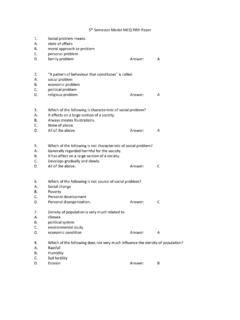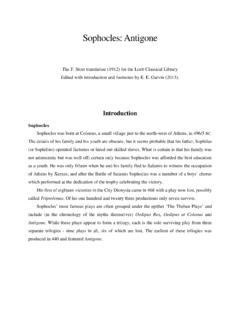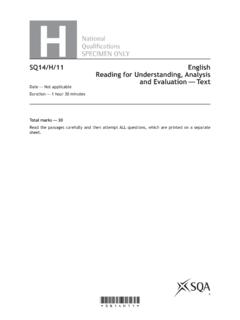Transcription of Final Report Honour Killing - NCHR
1 1 A STUDY ON Honour KILLINGS IN PAKISTAN AND RECOMMENDATORY CHECKS THROUGH LAW From: THE OFFICE OF THE CHAIRMAN NATIONAL COMMISSION FOR HUMAN RIGHTS GOVERNMENT OF PAKISTAN 2 Contents INTRODUCTION: .. 3 ANALYSIS OF LAW ON Honour Killing IN PRE-PARTITION ERA: .. 5 PAKISTAN PENAL CODE .. 6 JUDICIAL APPROACH REGARDING Honour Killing BEFORE THE CRIMINAL (AMENDMENT) ACT, 2004 .. 8 Honour Killing IN THE LIGHT OF QURAN AND SUNNAH .. 12 CURRENT LEGAL STATUS OF Honour Killing IN PAKISTAN .. 14 INTERNATIONAL OBLIGATIONS .. 19 RECOMMENDATIONS: .. 20 ANNEXURES 3 INTRODUCTION: Honour Killing defined by UNICEF; An ancient practice in which men kill female relatives in the name of family Honour for forced or suspected sexual activity outside marriage, even when they are the victims of rape.
2 However, the word Honour is not gender specific in itself and has a neutral dictionary meaning. Honour Killing is defined under Section. 299 of Pakistan Penal Code, 1860 as Offence committed in the name or on the pretext of Honour means an offence committed in the name or on the pretext of karo kari, siyah kari or similar other customs or practices .1 Cases of honor Killing in Pakistan are on the rise. According to The Human Rights Commission of Pakistan approximately 15222 cases of Honour Killing took place from In 2014, the number was 837 women including 75 minor. 3 Honour Killing is not specific to Pakistan and historically Honour killings have been known since ancient Roman times, when the pater familias, or senior male within a household, retained the right to kill an unmarried but sexually active daughter or an adulterous Honour -based crimes were 1 Inserted by Cr.
3 Law Amendment Act 2004 (Act I, 2005). PLJ 2005 Fed. St. 207 2 Media monitoring of human rights violations and concerns in Pakistan, HRCP, 3 4 Matthew A. Goldstein, "The biological roots of heat-of-passion crimes and Honour killings," Politics and the Life Sciences 21,2 (2002): 28-37. 4 known in medieval Europe where early Jewish law mandated death by stoning for an adulterous wife and her An example from Britain can be Catherine Howard the fifth wife of Henry VIII who was beheaded based on allegations of adultery. Honour killings can also be described as extra-judicial punishment of a female relative for assumed sexual and marriage offences. These offences, which are considered as a misdeed or insult, include sexual faithlessness, marrying without the will of parents or having a relationship that the family considers to be inappropriate and rebelling against the tribal and social matrimonial customs.
4 These acts of Killing women are justified on the basis that the offence has brought dishonour and shame to family or tribe .6 In Pakistan Honour Killing is known by the Urdu word Karo Kari which means a black male and a black female . Honour Killing was being practiced in the sub-continent in the form of Sati whereby a widow would voluntarily burn herself to death at the time of death of her husband. The same custom was abolished with the arrival of British and a general ban for the whole of India was issued by Queen Victoria in 1861. The Indian Sati Prevention Act from 1988 further criminalised any type of aiding, abetting, and glorifying of sati. The major cause of this heinous and deep rooted custom is to protect the integrity of the family and restore the Honour of the family under the influence of stern tribal laws and religious misinterpretations.
5 The motive 5 James A. Brundage, Law, Sex and Christian Society in Medieval Europe, Chicago: University of Chicago Press, 1987, 55. 6 Pakistan: Honour killings of women and girls, Amnesty International Report , September 1999 5 behind most of the reported Honour Killing cases are premarital or extramarital sex. Women have most of the times been killed on the mere suspicion of having an affair. Mr. Saad Rasool, Advocate in his article, The Qandeel brand of Honour stated that: To live freely, especially for women, continues to be a crime in this society, where neither the law, nor the people, nor a tainted interpretation of Divine decree, allows or protects this primordial gift of humanity.
6 7 ANALYSIS OF LAW ON Honour Killing IN PRE-PARTITION ERA: In the pre-partition era the cases of Honour Killing were tried under Section 300 of Indian Penal Code 1860 devised by the British, however, the same Section and Section 304(I) provided for a partial defence of grave and sudden provocation to a husband who had killed an adulterous wife, converting the charge of murder into manslaughter. Sections 300 and 304(1) are reproduced as under: Section 300 of Indian Penal Code, 1860 defined murder as Except in the cases hereinafter excepted, culpable homicide is murder, if the act by which the death is caused is done with the intention of causing However, definition of murder was subject to the following Exception 1 which provided a defence for sudden provocation: 7 The Nation.
7 The Qandeel brand of Honour , Saad Rasool Advocate 6 'Culpable homicide is not murder if the offender, whilst deprived of the power of self-control by' grave and sudden provocation, causes the death of the person who gave the provocation or Causes the death of and other person by mistake or accident", The old section 304 provided: "Whoever commits culpable homicide not amounting to murder, shall be punished with imprisonment for life, or imprisonment of either description for a term which may extend to ten years, and shall also be liable to fine, if the act by which the death is caused is done with the intention of causing death, or of causing such bodily injury as is likely to cause death; or with imprisonment of either description for a term which may extend to ten years, or with fine, or with both, if the act is done with the knowledge that it is likely to cause death, but without any intention to cause death or by causing such bodily injury as is likely to cause death".
8 The applicability of the above-said sections can be seen in the case of Emperor vs Dinbandhu Ooriya (AIR 1930 Cal 199), Calcutta High Court held that: It is well established law that if a husband discovers his wife in the act of adultery and thereupon kills her he is guilty of manslaughter only and not of murder. [Paragraph 13] PAKISTAN PENAL CODE 7 The same Penal Code was adopted by Pakistan after partition with the said provisions and such provisions were used from time to time by the Courts to award reduced sentences even in cases regarding Honour Killing . In Muhammad Saleh versus The State (PLD 1965 SC 366), Accused was convicted of murder under Section 300 of Old Penal Code.
9 The facts of the case are that accused woke up late at night and could not find her sister in her cot, he went outside with a hatchet where he found his sister with her paramour in the wheat fields having sexual intercourse. He killed both of them with the hatchet. Mr. Chief Justice Cornelius held that: The taking of a hatchet can be explained by the fact that it was still dark, that is, for self protection, and it may be the accused expected to have to chastise his sister for mis-behaviour if that was found. But upon the admissible evidence in this case, there is no ground for thinking that the appellant expected to find his sister in an act of intimacy with a stranger. He must be allowed, on the evidence, the benefit of a shock, on making the discovery, such as is fully recognised in law as furnishing grave and sudden provocation within the meaning of Exception I to section 300, P.
10 P. C., sufficient to cause loss of self control. It is pertinent to mention here that the Shariat Bench of Honourable Supreme Court of Pakistan in case titled as Federation of Pakistan v Gul Hassan Khan cited as PLD 1989 SC 633 declared Sections 299 to 338 of the Pakistan Penal Code repugnant to the injunctions of Islam. In particular, the court noted that these sections do not provide for retaliation, monetary 8 compensation, compromise, and pardon, as called for in the Qur'an and Sunnah. Section 302, was inserted in the Penal Code to account for the omission of the earlier sections which reads as follows; 302. Punishment of qatl-e-amd: Whoever commits qatl-e-amd shall, subject to the provisions of this Chapter be: (a) punished with death as qisas; (b) punished with death or imprisonment for life as ta'zir having regard to the facts and circumstances of the case, if the proof in either of the forms specified in Section 304 is not available; or (c) punished with imprisonment of either description for a term which may extend to twenty-five years, where according to the injunctions of Islam the punishment of qisas is not applicable.







